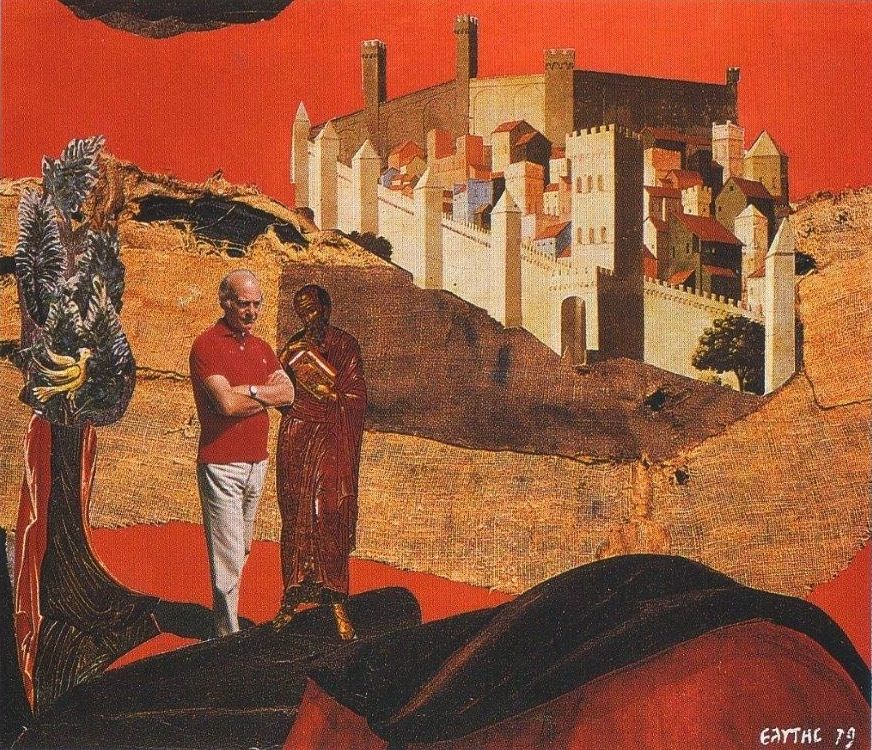
Odysseus Elytis (pen-name for Odysseus Alepoudhelis), Nobel Prize in Literature 1979, was born in 1911 at Herakleion in Crete. The family, which originally came from Lesbos, moved in 1914 to Athens, where Elytis, after leaving school, began to read law. He broke off his studies, however, and devoted himself entirely to his literary and artistic interests. He got to know the foremost advocate in Greece of surrealism, the poet Andreas Embirikos, who became his lifelong friend. As time went on impulses from Embirikos and others became merged with Elytis’ Greek-Byzantine cultural tradition. In 1935 he published his first poems in the magazine Nea Ghrámmata (New Letters) and also took part – with collages – in the first international surrealist exhibition arranged that year in Athens. In 1936 and 1937, in the magazine Makedhonikés Iméres (Macedonian Days) followed a collection of poems with the title Prosanatolizmoí (Orientations), in book form 1939, I klepsídhres tou aghnóstou (Hourglass of the Unknown) and, in 1943, Ilios o prótos (Sun the First).
Deeply felt experiences from the war lie behind the work that made Elytis famous as one of the most prominent poets of the Greek resistance and struggle for freedom: Ásma iroikó ke pénthimo yia ton haméno anthipolohaghó tis Alvanías (Heroic and Elegiac Song for the Lost Second Lieutenant of the Albanian Campaign) 1945.
After the war Elytis was engaged in various public assignments (among other things he was head of programs at the radio) and, apart from literary and art criticism, published very little for more than ten years. The work begun in 1948, To Áxion Estí (Worthy It Is), did not appear until 1959. The years 1948-52 he spent in Paris and travelling. He came in close contact with writers like Breton, Eluard, Char, Jouve and Michaux and with artists such as Matisse, Picasso and Giacometti. The poetic cycle To Áxion Estí (with introductory words taken from the Greek-Orthodox liturgy) has come to be recognized as Elytis’s greatest work. It has been translated into several languages and in 1960 was awarded the National Prize in Poetry. It was set to music by Míkis Theodorákis in 1964.
Of later works – in several cases illustrated by the author himself or by his friends Picasso, Matisse, Ghika, Tsarouchis and others – can be mentioned: Exi ke miá típsis yia ton uranó (Six and One Remorses for the Sky) 1960, O ílios o iliátoras (The Sovereign Sun) and To monoghramma (The Monogram), both 1971, Ta ro tou érota (The Ro of Eros) 1972, Villa Natacha 1973, Maria Neféli 1979, and the collection of essays with a personal touch Anihtá hártia (Open Book) 1974. “Selected Writings;” (with collages by the author) recently appeared, and no less than three entirely new works await publication.
Translations of Elytis’s poems have been printed in literary magazines and anthologies, but can also be found in a number of separate volumes:In English:
The Sovereign Sun: Selected poems. Kimon Friar, transl. Philadelphia: Temple Univ. Press, 1974.
The Axion Esti (bilingual ed.) Edmund Keeley Georges Savidis, transl. Pittsburgh: Univ. of Pittsburgh Press, 1974.
In French:
Six plus un remords pour le ciel. Texte francais de F.B. Mache. Montpellier: Fata Morgana, 1977.
In Italian:
Poesie. Trad. Mario Vitti. Roma 1952.
21 poesie. Trad. Vincenzo Rotolo. Palermo: Ist. Siciliano di Studi Bizantini e Neoellenici, 1968.
In German:
Korper des Sommers. Auagewahlte Gedichte. Neugriechisch u. deutsch. Uebertr. Antigone Kasolea u. Barbara Schlorb. St. Gallen: Tschudy Verlag 1960.
Sieben nachtliche Siebeneeiler. Griechisch-Deutsch. Uebertr. Gunter Dietz. Darmstadt: J.G. Blaschke Verlag, 1966.
To Axion Esti-Gepriesen Sei.Uebetr. Gunter Dietz. Hamburg: Claassen Verlag, 1969.
Mission of the Elytis Chair Fund at Rutgers The State University of New Jersey
The Elytis Chair Fund is a non-profit organization that was founded in February of 1989 specifically “for the purpose of promoting, encouraging, and financially supporting Neohellenic Studies… at Rutgers, The State University of New Jersey.”
Funds that were raised over the years, from the contributions of the Greek-American Community of New Jersey, have provided the financial base that has sustained, and continues to sustain without any interruption, the Modern Greek Studies Program at Rutgers University.
